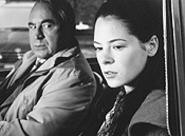Which is not to say that Felicia's Journey is a bad movie; quite the contrary, in fact. But it's probably as far from crowd-pleasing as you're going to get these days. Directed by moody Canadian Atom Egoyan and adapted reasonably faithfully from the novel by Irish writer William Trevor, the film is essentially a study of two contrasting characters looking for love in all the wrong places. That one of them may be more dangerous than he appears is certainly cause for ample dramatic tension, but those looking for gruesome murders and/or easy answers should look elsewhere. Those familiar with Egoyan's work, however, will feel right at home.
Older men obsessed with teenage girls have become something of a fascination for Egoyan, so Trevor's novel is perfectly suited to his talents. Spunky young Irish girl Felicia (Elaine Cassidy) has journeyed to England in the hopes of finding her first love, Johnny Lysaght (Peter McDonald), who left their village in Ireland before he could give her his address. Although he had claimed to be employed in a lawn-mower factory in Birmingham, rumors abounded that his true purpose was to join the British army, making him an outcast in his village and especially with Felicia's father, who is a direct descendant of one of the 1916 Easter Uprising leaders. When Felicia is told in no uncertain terms that she can either forget about Lysaght or leave the family and never come back, she chooses the latter option and ends up in an industrial wasteland outside of Birmingham, searching in vain for the elusive lawn-mower factory.
Enter Mr. Hilditch (Hoskins), a tubby, soft-spoken catering manager at one of the local factories. Spying the young-girl-in-need, he points her in the direction of a boarding house and offers to give her a ride to the next town, where there might be another factory worth checking. Hesitant at first, Felicia eventually accepts Hilditch's kindness, especially when he tells her that his ailing wife lives in the same nearby town, and he'd be going there anyway.
The only thing is, Hilditch doesn't have a wife. And he's prone to secretly videotaping anyone who steps into his car. Turns out he has a vast collection of tapes in his house, all of young runaway girls. He doesn't seem capable of violence, but why does he have so much to hide? And did he help or hinder all the runaways he knew before?
Remember, no easy answers. Suffice it to say that Hilditch begins to help Felicia in her search for Johnny, but his own agenda may be vastly different from hers. And unlike the novel, which is mostly interior monologues that make the characters' psychology somewhat clear, Egoyan keeps a slight distance, giving us glimpses inside Hilditch's mind but never a complete picture. Some audiences may find this maddening, but it does keep the viewers on their toes.
The one blatant departure from the novel, however, is a highly questionable choice. While Hilditch in the book had long-standing abandonment issues based on his mother having slept around, Egoyan has envisioned the mother as a comedic French Julia Child, whom Hilditch endlessly watches and imitates on old black-and-white reruns. She never seems anything less than a loving (albeit busy) parent in flashbacks, while young Hilditch is shown stealing a wallet. (So he's bad from birth?) While comic relief can indeed be important in such a dark-toned and slow-paced film, this is not the way to do it.
The ending has also been fiddled with, and without giving away anything significant, let's just say that what is described as a pattern of events in the book is condensed into one incident in the film, leading to an epiphany that's a little less than believable (it involves Jehovah's Witnesses bearing pop-up books). Other changes are an inevitable result of adaptation, including a climactic confrontation that's more dramatically satisfying than in the novel and a coda scene that's extraordinarily similar to that of Egoyan's last film, The Sweet Hereafter.
The tension is always compelling, but the tone of the piece is relentlessly dark. Felicia's Journey is not everybody's cup of tea. But once you've seen it, you certainly won't forget it.


